- Home
- Colson Whitehead
Zone One Page 9
Zone One Read online
Page 9
Some of the marines died. Some of them didn’t hear the warnings until too late for all the gunfire. Some of them lost their bearings in the macabre spectacle, drifting off into reveries of overidealized chapters of their former lives, and were overcome. Some of them were bit, losing baseballs of meat from their arms and legs. Some of them disappeared under hordes, maybe a glove sticking out, waving, and it was unclear if the hand was under the direction of the fallen soldier or if it was being jostled by the feasting. Funeral rites were abbreviated. They incinerated the bodies of their comrades with the rest of the dead.
They nozzled diesel into the bulldozers and dump trucks. The air filled with buzzing flies the way it had once been filled with the hydraulic whine of buses, the keening of emergency vehicles, strange chants into cell phones, high heels on sidewalk, the vast phantasmagorical orchestra of a living city. They loaded the dead. The rains washed the blood after a time. The New York City sewer system in its bleak centuries had suffered worse.
The marines were redeployed, some upstate to hasten completion of the northern initiatives, others to hush-hush engagements out West. Not many details apart from that. The army arrived, then the corps of engineers with plans for the next phase. They cradled the tubes of blueprints and schematics of the metropolitan systems under their armpits, bestowed upon them by Buffalo after excavation from some undisclosed climate-controlled government storehouse.
Any structure under twenty stories was left to the sweepers. Hence Mark Spitz. When his unit finished number 135, they were done with Duane x Church, Mixed Residential/Business. Then it was on to the next.
“Shouldn’t be too many hostiles,” Kaitlyn said. They started back up the stairs of 135 Duane. The sweepers gobbled and assimilated the military lingo into their systems with gusto. Mingled with the fresh slang, the new vocabulary of the disaster was their last-ditch armor plate. They tucked it under their fatigues, over their hearts, the holy verses that might catch the bullet.
Other phrases in vogue were less invigorating and uplifting: extinction, doomsday, end of the world. They lacked zing. They did not stir the masses from their poly-this poly-that inflatable mattresses to pledge their lives to reconstruction. Early in the reboot, Buffalo agreed on the wisdom of rebranding survival. They maintained a freakish menagerie of specialists up there, superior brains yanked from the camps, and what did these folks do all day but try and think up better ways to hone the future, tossing ideograms up on whiteboards and conferring at their self-segregated tables in the sublevel cafeteria, lowering their voices when outsiders walked by balancing orange trays. Some of them were hard at work crafting the new language, and they came up with more than a few winners; the enemy they faced would not succumb to psychological warfare, but that didn’t mean that the principles needed to remain unutilized.
It was a new day. Now, the people were no longer mere survivors, half-mad refugees, a pathetic, shit-flecked, traumatized herd, but the “American Phoenix.” The more popular diminutive pheenie had taken off in the settlements, which also endured their round of cosmetics, as Camp 14 was rechristened New Vista, and Roanoke became Bubbling Brooks. Mark Spitz’s first civilian camp was Happy Acres, and indeed everyone’s mood did brighten a bit on seeing that name on the gate next to the barbed wire and electric fencing. Mark Spitz thought the merchandise helped out a lot, too, the hoodies and sun visors and such. The frigid hues and brittle lines of the logo conformed to a very popular design trend in the months preceding Last Night, and it was almost as if the culture was picking up where it left off.
Omega discovered 135 Duane’s lone straggler on four. After the conference room, it was clear sailing, no skels, and since this was not a residential building, no pets, the odd bichon frise or hypoallergenic kitty decomping on the scuffed aquamarine corridor tile. The fourth floor had been hacked into a warren of one- and two-room offices, most without windows. Last-chance operations outracing collection agencies and bankruptcy judges, slumping into sadder and shoddier offices in their withering prospects. Half extinct before the coming of the plague, it was that last bad winter that wiped them off the Earth.
The straggler stood in the back room of an empty office. No telling what the former enterprise had been. Half-crushed cardboard boxes rested on the beige carpet next to crumpled sheets covered with the black lines and rows of the best-selling spreadsheet program. A beat-up telephone trailed its umbilicus, caught mid-crawl from the premises. The copy machine dominated the back room, buttons grubbed by fingerprints, paper tray sticking out like a fat green tongue. The straggler’s right hand held up the cover and he bent slightly. Like all stragglers, he did not flinch at their approach. He peered into the glassed-off guts of the machine, as still as the dust, bent paper clips, overnight-mail packaging, and other assorted leavings in the room.
“Ned the Copy Boy enjoyed his job. Enjoyed it too much,” Mark Spitz said.
“Come on, you can do better than that,” Kaitlyn said.
He was a young man, dwindled in his clothes like all skels, but his red bow tie cinched his collar around his neck. He appeared to have been bitten in his armpit; a cone of dried blood terminated there, fanning out in the lumpy shape of a rocket ship’s exhaust.
Gary thought and contributed, “More toner, stat!”
Kaitlyn rattled off in quick succession: “My God, it’s full of stars.” And, “If we can identify whose gluteus maximus this is, we’ll have our culprit.” Finally, “I can see my house from here.”
Solve the Straggler broke up the day with its meager amusements and unearthed a vein of humor in Kaitlyn, a glimpse of the kind of wit she had shared with her friends, family, and members of her favored social-media networks. The game served another purpose in that it gave the sweepers mastery over a small corner of the disaster, the cruel enigma that had decimated their lives. How did the copy boy, or copy repairman, or toner fetishist end up here? Had he traveled miles, had he been here since Last Night? Had he worked in this office six incarnations ago, when it was an accountant’s or dietitian’s office? The most frightening proposition was that he had no connection to this place, that this fourth-floor office was simply where he broke down. If his presence here was random, then why not an entire world governed by randomness, with all that implied? Solve the Straggler, and you took a nibble out of the pure chaos the world had become.
It was certainly less bleak than Name That Bloodstain!, another pastime. What do you see?—that kid’s cloud game gone wrong: Mount Rushmore, Texas, a space shuttle, a dream house, my mom’s grave. Like all sweepers they joshed about the strange creatures before them, trying to muster the most clever hypothesis about how the Girl Scout ended up in that boxing ring, or why the guy in the bus-driver uniform was bent in the ice-cream store freezer scooping up dried cakes of mud. The answers to Solve the Straggler were logical, fanciful, or absurd (“Bananas!” Kaitlyn shouted once), according to the tenor of the day.
Skel mutilation was another popular amusement, although not on Kaitlyn’s watch, not that Mark Spitz was so inclined. He assumed that Gary had indulged in abhorrent Connecticut, where it was a local custom. “Just having fun,” the excuse went, on the rare occasions when one was asked for. A neutralized skel was a perfect stage for one’s sadism, whether you were a dabbler, merely taking your time in terminating the thing before you, pruning a finger here or an ear there, or a master-level practitioner, restless all night trying to think up novel variations.
The stragglers posed for a picture and never moved again, trapped in a snapshot of their lives. In their paralysis, they invited a more perplexing variety of abuse. One might draw a Hitler mustache on one, or jab a sponsor cigarette between a straggler’s lips. Administer a wedgie. They didn’t flinch. They took it. And then they were deactivated—beheaded or got their brains blown out. Although the subject was not mentioned in the PASD seminars Herkimer held with the camp shrinks, it was generally assumed that this behavior was a healthy outlet. Occupational therapy.
Mark Spit
z had noticed on numerous occasions that while the regular skels got referred to as it, the stragglers were awarded male and female pronouns, and he wondered what that meant. “What’s his name?” he said.
“What do you mean, what’s his name?” Gary said.
“It has to be something.”
“Buffalo don’t want the names.”
“Still.”
“His name is Ned the Copy Boy.”
“What if we let him stay?” Mark Spitz didn’t know why he said it. “He’s not hurting anyone. Look at this room. We’re standing in the most depressing room in the entire city.”
His comrades looked at each other but did not comment. “Let’s wrap this puppy up,” Kaitlyn said, and popped him in the head.
If they had played Name That Bloodstain!, Mark Spitz would have said, North America. They would need a lot of new windows in the days to come, he thought. And plenty of bleach. These would be thriving industries, full of opportunities. Perhaps Gary should hang up his Lasso and get into the blood-scrubbing industry. Get in on the ground floor. Erase the stains.
The copy boy was the final straggler in the building. Kaitlyn recorded his details in the notebook. They dragged the body out into the twilight and punched out for the day as Disposal’s bell jingled in the distance. Mark Spitz listened to it fade. It was the sound of the god of death from one of the forgotten religions, the one that got it right, upstaging the pretenders with their billions of duped faithful. Every god ever manufactured by the light of cave fires to explain the thunder or calling forth the fashionable supplications in far-flung temples was the wrong one. He had come around after all this time, preening as he toured the necropolis, his kingdom risen at last.
• • •
His unit had slept the last four nights in a former textile warehouse that had been converted into spectacular lofts, alcoves of glamour notched into the cliff face of the city. The apartment they chose belonged to the drummer of a minor rock outfit whose one big charter was a muscular anthem that tried to identify, verse by verse, the meaning of stamina. It was a stadium staple, a real rouser, the royalties evidently providing ample down-payment money. In the blown-up magazine covers on the walls, the owner was perpetually on the verge of being elbowed from the frame by the rest of the band, who were of a more rarefied attractiveness. Such was the drummer’s lot. An orgy tub squatted in the center in the master bath, roomy and guardrailed.
Omega slept in the living room, taking turns on the white sectional. It was pleasant in the loft; one night they even made a fire. Kaitlyn discovered a tube of her favorite moisturizer in the medicine cabinet and Gary caught her taking a dab. He tsk-tsked and pulled out his No-No Cards, brandishing the one depicting a red slash across an open fridge door. The massive, oversize windows didn’t have shades or blinds, but there were no neighbors gathering gossip in the beyond, no ambient street light to keep them awake, no light at all.
They spent their last night on this grid, however, on the eighteenth floor of number 135, at Mark Spitz’s request. In general, they bivouacked on the lower floors, for obvious reasons. In normal circumstances, Kaitlyn and Gary would have vetoed this choice of camp, but they relented without protest. Mark Spitz had been unusually quiet ever since the attack, save for his strange intercession on behalf of the copy boy. If he sought something in this place, something he needed, they were willing to climb all those flights and help him out. This time. He’d used up his chits for a while.
They unrolled their sleeping bags in the conference room of a consulting firm, shoving the gargantuan desk up against the wall and laying their packs across it. They consumed their MREs and eased into their nocturnal rituals after activating a motion detector in the hallway: Gary smoked and skipped through sections of his foreign-language audiobook, Kaitlyn speed-read one of her biographies of dead celebrities, and Mark Spitz paced. After so long in the wild, it still took Mark Spitz a long time to power down his myriad subsystems. There are pills, Gary told him, but he didn’t want to be dulled. He was wired at night, bucking on a vector of PASD, but it had kept him alive.
The sleeping bag was comfortable enough on the teal carpet squares, but he missed sleeping in the trees, entwined in the branches like a kite. In the woods bordering the dead subdivision, in a public park going native according to primeval inclination, levitating over koi in the acupuncturist’s backyard garden. In those early days, he roved from empty house to empty house like the other isolates, making it up as he went along. He cased the abode in advance of night, selected his entry point, and then swept the ranch house or split-level or other locally popular construction room by room. He checked the basements, the closets, the dryer (you never know), made test noises to draw out any skels inside, but not loud enough to alert a pack cruising outside. He discovered plague-stricken unfortunates who had been locked away in attics like the photo albums of bad weddings, and came upon leaking wretches handcuffed to bedposts by fluffy erotic handcuffs. He put down any skel or skels who emerged from the den or romper room and he made a hasty retreat if it got too hot, taking the pile-covered stairs two at a time or vaulting out the window, the inevitable window, landing messily on the patio set. He knew when it was time to split. It clicked in his brain, the same way he’d known which desk to choose in a new classroom on the first day of a fresh school year, the one that would place him in a zone that reduced the chances of being called on, amid a high concentration of smart kids and inveterate hand-raisers but at a distinct and quirky angle to the teacher’s vision that enabled Mark Spitz to pop in and out of his or her attention. The same way he knew exactly how late he could roll into work without it becoming “an issue,” how often he could pull off this feat, and how busy he had to appear at different times of the day according to his boss’s scofflaw-seeking trawls through the cubicles. He’d always known when to say “I love you” to keep the girlfriends cool and purring, how much to push a deadline without repercussion, how to smile at the representatives of the service industry so that he got a decent table or extra whip. In his mind, the business of existence was about minimizing consequences. The plague had raised the stakes, but he had been in training for this his whole life.
Gary said, “Day ha-may in poz. Day ha-may in poz.”
He went into a tree cycle for months at a time, weather permitting (that quaint picnic language), because he hated bunking in an empty house knowing that its occupants were most likely some variety of dead. Perhaps this was the start of his aversion to ID detail, all those times he pushed a bureau up against the door of a bedroom and watched the crap on top tumble to the floor, boxes of gaudy jewelry, cologne in turquoise glass, the family pictures in the fragile plastic frames. It was worse when he came across a straggler, although he didn’t know the word then. A woman in a bathrobe measured out coffee into the Swedish machine, frozen there. A teenager wielded a lacrosse stick in his funky bedroom, and in the next town over the pigtailed little princess arranged chewed-up unicorns on the cardboard top of an old board game that had never made it into her family’s regular rotation, a fad game with too many or too few instructions. He bashed their heads in with a baseball bat of course; he’d quickly cottoned on to their harmlessness, but didn’t know back then if they’d suddenly awaken at some inner cuckoo chime and start the chase. The plague didn’t let you in on its rules; they weren’t printed on the inside of the box. You had to learn them one by one. The majority of skels were rabid, and then there was this subset. It was early enough in the unpleasantness that they hadn’t begun to waste away yet, earn the name skeleton. Which made it worse. In the half-light, before he could see their wounds, he was a harmless cat burglar who accidentally broke into the wrong house, the one next door to his target. The occupants were home. He wanted to apologize, and did on a few occasions. They didn’t respond. They looked like regular people, until he saw the missing parts or the make-shift, suppurating bandages. Cemetery statuary, weeping angels and sooted cherubs, standing over their own graves. Stick to the trees, he
told himself.
Gary said, “Kwan-to kwesta? Kwan-to kwesta? Kwan-to, kwan-to.”
He learned to keep still, ease into a sleep shallow enough to still perceive and react to peril, practicing a quick jungle swing/running/landing combo in case one or more of them looked up and saw him, which they never did. They never came when you were vigilant; they came for you when you had one foot in the past, recollecting a dead notion of safety. Way he saw it, if you were going to get surrounded, you were going to get surrounded—if your luck went that way, it didn’t matter if you were up an oak or in a colonial revival.
The first time he’d shared his tree affinity with another survivor, she said, “So what? Everybody sleeps in the trees from time to time.” They’d all done the same things during the miseries. Manhattan was a template for other feral cities and Mark Spitz was a sort of template, too, he’d figured out. The stories were the same, whether Last Night enveloped them on Long Island or in Lancaster or Louisville. The close calls, the blind foraging, the accretion of loss. Half starved on the roof of the local real estate office, crouching so they wouldn’t be seen from the street and have the ravenous dead clot around the only exit. Contorted in a stainless-steel restaurant cabinet and waiting for morning to break, when it was time to split for the next evanescent refuge. Listening, ever listening for footsteps. The insomniac’s brutal scenario had become the encompassing reality across the planet. There were hours when every last person on Earth thought they were the last person on Earth, and it was precisely this thought of final, irrevocable isolation that united them all. Even if they didn’t know it.
Kaitlyn said, “Can you not do that in here? Hello—secondhand smoke kills.”
Mark Spitz wondered how Gary would handle changing these common Spanish phrases for use with his dependable “we.” “Gary, you gonna catch a ride on that sub to get to your island?”

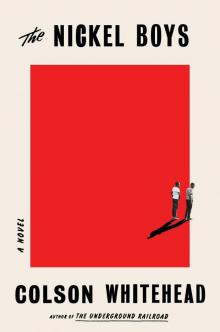 The Nickel Boys
The Nickel Boys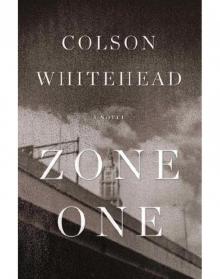 Zone One
Zone One The Underground Railroad
The Underground Railroad The Colossus of New York
The Colossus of New York The Intuitionist
The Intuitionist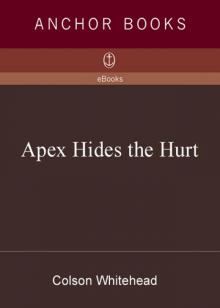 Apex Hides the Hurt
Apex Hides the Hurt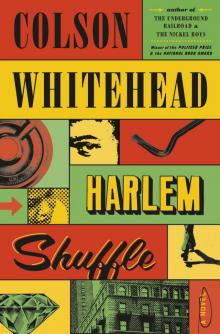 Harlem Shuffle
Harlem Shuffle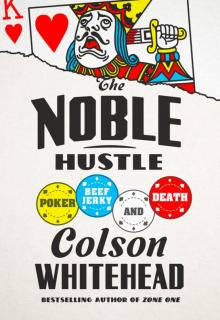 The Noble Hustle
The Noble Hustle